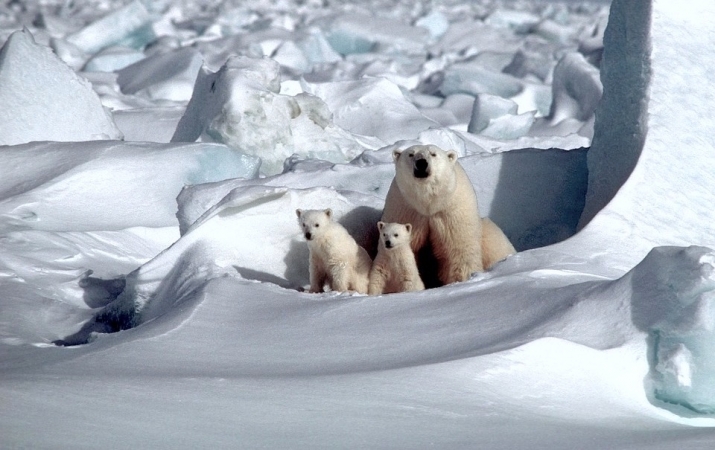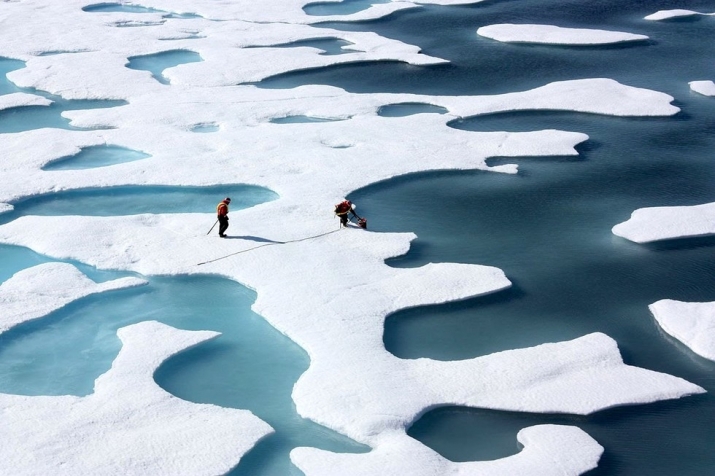NEWS
Arctic Melt Occurring at an Unprecedented Rate, Experts Warn
 From pixbay.com
From pixbay.comThe conclusions of a newly released five-year scientific study suggest that Arctic Sea ice is melting at an unprecedented rate as a result of rising global temperatures, and scientists warn that the effects could be irreversible and far-reaching, leading to a host of potentially catastrophic climate change tipping points.
Published last week, the Arctic Resilience Report, an Arctic Council project led by the Stockholm Environment Institute and the Stockholm Resilience Centre, identified 19 tipping points* “that can and have” occurred in marine, freshwater, and terrestrial ecosystems: “Arctic ecosystems are changing in dramatic ways: the ice is melting, sea levels are rising, coastal areas are eroding, permafrost is thawing, and the areas where plants and animals live are shifting,” the report states. (Arctic Council)
“This ground-breaking report, based on direct evidence from case studies across the circumpolar Arctic, is an unprecedented effort to gain insight from what is happening on the ground in the region’s social-ecological systems," said project co-chair Joel Clement, who is also director of the Office of Policy Analysis at the U.S. Department of the Interior. (Stockholm Resilience Centre)
Several of the tipping points are directly related to shrinking ice masses—both on sea and on land—which play a key role in influencing global temperatures by reflecting much of the sun’s energy. When this ice cover is reduced, that heat is instead absorbed, leading to further temperature increases, which in turn accelerates melting.
“The warning signals are getting louder,” said Marcus Carson of the Stockholm Environment Institute and one of the report’s lead authors. “[These developments] also make the potential for triggering [tipping points] and feedback loops much larger.” (The Guardian)
Researchers monitoring satellites and Arctic weather stations have expressed alarm over seasonal Artic temperatures, which have been only a few degrees above freezing when -25ºC should be expected for this time of year, while ocean temperatures were nearly 4ºC higher than usual on average in October and November.
“It’s been about 20ºC warmer than normal over most of the Arctic Ocean, along with cold anomalies of about the same magnitude over north-central Asia. This is unprecedented for November.” said Rutgers University research professor Jennifer Francis. “These temperatures are literally off the charts for where they should be at this time of year. It is pretty shocking. The Arctic has been breaking records all year. It is exciting but also scary.” (The Guardian)
The Arctic Resilience Report also reveals how human populations in the region respond to climactic changes, highlighting examples of communities in which livelihoods are disappearing and cultural identities are being eroded. “Climate change is severely stressing Arctic livelihoods and people, and the extent to which Arctic people can build resilience to these stresses is quite limited,” said Stockholm Resilience Centre researcher Miriam Hultric, a lead author. “Without rapid action to slow climate change by reducing greenhouse gas emissions, the resilience of the Arctic will be overwhelmed.” (Stockholm Resilience Centre)
The Arctic’s ecosystems are closely interlinked with the planet as a whole and such dramatic changes herald a range of potential far-reaching consequences, including rising sea levels, changes in the polar vortex, and warming ocean currents that impact global weather patterns. “Arctic social and biophysical systems are deeply intertwined with our planet’s social and biophysical systems, so rapid, dramatic, and unexpected changes in this sensitive region are likely to be felt elsewhere,” the authors of the report observe. “As we are often reminded, what happens in the Arctic doesn’t stay in the Arctic.” (Arctic Council)
 Scientists study how changing conditions in the Arctic affect the ocean's chemistry and ecosystems. Photo by Kathryn Hansen. From pri.org
Scientists study how changing conditions in the Arctic affect the ocean's chemistry and ecosystems. Photo by Kathryn Hansen. From pri.org* Arctic regime shifts (Stockholm Resilience Centre)
See more
Arctic Resilience Report (Arctic Council)
Amid rapid change, major Arctic study highlights need to prepare for surprises (Stockholm Environment Institute)
Dealing with Arctic tipping points (Stockholm Resilience Centre)
Arctic ice melt could trigger uncontrollable climate change at global level (The Guardian)
'Extraordinarily hot' Arctic temperatures alarm scientists (The Guardian)
Rapidly Changing Arctic Braces for Destabilization (Scientific American)
Related news from Buddhistdoor Global
Gyalwang Drukpa Warns of Climate Change Threat to Himalayan Water Sources
World’s Largest Marine Wildlife Sanctuary Created in Antarctica
Can Tree-planting Drones Help Save the World’s Forests?
Buddhist Monks Working to Tackle Deforestation in Cambodia
Environmental Engineer Urges Mekong River Development Based on Buddhist Principles
Vatican Extends a Call to Arms to Buddhists on Vesak Day to Address Eco-crisis
Dalai Lama Lends Weight to Interfaith Climate Change Statement
Bhutan Plants 108,000 Trees to Celebrate Birth of Crown Prince
Reforestation: Creating a Greener World
The Buddhist Monk Who Helped Broker a Global Climate Deal
Buddhist Climate Change Statement Delivered to President Hollande
Top Buddhists Sign Landmark Statement on Climate Change to Global Leaders
Related features from Buddhistdoor Global
Buddhistdoor View: The Dharma’s Place in the Global Climate Change Crisis
Buddhistdoor View: The UN and Buddhist NGOs—Untested Partnerships
Eco-wisdom and Effort
Time to Stand Up: An Engaged Buddhist Manifesto for our Earth – The Buddha’s Life and Message through Feminine Eyes – Book Review
Conscientious Compassion—Bhikkhu Bodhi on Climate Change, Social Justice, and Saving the World
Earth Day and Eco-Dharma: Celebration and Somber Reflection














